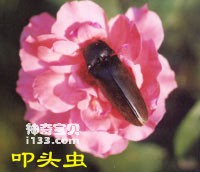Once an insect of the family Knockidae is caught, it will kowtow on your hand, hence its vivid name - Kowtow bug. Children often catch knocking beetles (adults) in the wild and play with them. They use their thumbs and index fingers to gently pinch its hind abdomen and elytra ends, and turn its head toward itself, so the knocking beetle bends its front chest downward, and then He picked it up straight again and made a "click" sound at the same time. He repeated this process as if he was kowtowing continuously. In fact, it is not really kowtowing to you for mercy, but struggling to escape. This is its way of self-rescue. If you don't pay attention, it will bounce away. This insect also transmits information by "knocking its head" to attract the opposite sex.

Why can kowtow bugs kowtow?
Because there is a transverse seam (concave) between the pronotum and the base of the elytra, and the prothoracic and abdominal plates have a wedge-shaped process extending backwards, which just inserts into the groove of the middle thorax and abdomen, thus forming a bouncing body. structure. If you put it back down on a flat surface so that the insect is lying on its back, it will first straighten its chest and bend its back, tilt its head and front chest back, and bend its back chest and abdomen downward, so that the middle of the body leaves the plane and forms an arch shape. Then rely on the strong contraction of the muscles to draw the front chest toward the middle chest. The back of the chest hits the plane, and the body bounces up with the help of the recoil of the plane, thus turning over. Its bounce height can reach more than 30 cm. The skillful and graceful turning movements of the kowtow bug are really like the "forward roll" and "supine leap" performances of gymnastics. Put some fruit in the breeding box and they can live for a longer period of time. If you catch multiple male worms, you might as well put them together and watch the wonderful scene of their fighting, regaining a bit of childishness!
Knocking nails are mostly small and medium-sized species, with small heads, long and narrow bodies, pointed ends, and slightly flattened. The body color is gray, brown, brown and other dark colors, and the body surface is covered with fine or scaly hairs, forming different spots or stripes. Some large species are brightly colored and shiny. Completely perverted. The life history is relatively long, with one generation completed in 2-5 years. The larvae have slender bodies and golden color, so they are called wireworms and iron worms. It lives in underground soil and can damage sown seeds, plant roots and tubers, making it an important underground pest. There are more than 10,000 recorded species of knock beetles in the world, and about 600 species are known in my country.

animal tags:
We created this article in conjunction with AI technology, then made sure it was fact-checked and edited by a Animals Top editor.